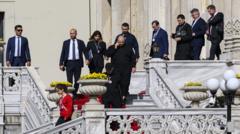Despite ongoing hostilities, Russia and Ukraine have engaged in failed peace negotiations, although they were able to agree on a significant exchange of prisoners of war.
Russia and Ukraine Struggle to Find Common Ground in Peace Talks

Russia and Ukraine Struggle to Find Common Ground in Peace Talks
Recent peace negotiations yielded no ceasefire but facilitated a prisoner exchange
In a notable meeting held in Istanbul, Turkish officials facilitated discussions between Russia and Ukraine, yet the outcome was far from a resolution after an hour-long dialogue. Ukrainian representatives expressed their continued insistence on an “unconditional ceasefire,” classified as essential by both Kyiv and its western allies. The lack of agreement on this fundamental demand demonstrated the deepening divides between the two nations, which have been embroiled in conflict since Russia launched its full-scale invasion of Ukraine in February 2022.
Russian negotiators suggested a limited, two- to three-day ceasefire in select regions, yet they offered scant details. During the talks, an understanding was reached to swap sick and wounded prisoners of war, including those under 25. Still, skepticism loomed over the negotiations, given that Ukraine maintains control over approximately 80% of its territory, with Russia occupying around 20% including Crimea.
Ukrainian Defence Minister Rustem Umerov, leading Kyiv's representatives, reiterated Ukraine's demands for a comprehensive ceasefire lasting at least 30 days across all domains—land, sea, and air. Following Russia's inadequate proposals presented during the meeting, Ukrainian President Volodymyr Zelensky criticized Moscow's suggestion for a temporary ceasefire merely to recover casualties. He emphasized the core purpose of a truce should be to safeguard lives.
While the details of both sides' proposals have not been publicly disclosed, Russian state media outlined Moscow's positions which included demands for Ukrainian troop withdrawals from occupied areas, military demobilization, and various measures aimed at developing a lasting peace, often perceived as tantamount to Ukrainian capitulation. Notably, Zelensky highlighted that any forces captured during their offensive should be exchanged for the thousands of Ukrainian troops who have fallen.
The dialogue, taking place just a month after the first round of negotiations also ended without significant progress, revealed concerns from both sides about the likelihood of future breakthroughs. Given Russia's intransigence on key issues, the fear grows that these discussions are being used as a strategy for territorial gain under the guise of diplomacy.
Further complicating matters, both Ukraine and the U.S. claimed that Russia had been delaying negotiations as a tactic to gain more ground in Ukraine, while U.S. President Donald Trump signaled he remained open to facilitating discussions, despite ongoing criticism of Russia's aggression. In a separate commentary, President Zelensky called for increased economic sanctions against Russia, asserting that without significant pressure, prospects for genuine peace remain bleak.
As Ukraine prepares to respond to Russia's proposals due at the end of the month, there are palpable concerns about the future of direct talks between Zelensky and Putin, with little indication of a path toward collaboration emerging in the interim.
Russian negotiators suggested a limited, two- to three-day ceasefire in select regions, yet they offered scant details. During the talks, an understanding was reached to swap sick and wounded prisoners of war, including those under 25. Still, skepticism loomed over the negotiations, given that Ukraine maintains control over approximately 80% of its territory, with Russia occupying around 20% including Crimea.
Ukrainian Defence Minister Rustem Umerov, leading Kyiv's representatives, reiterated Ukraine's demands for a comprehensive ceasefire lasting at least 30 days across all domains—land, sea, and air. Following Russia's inadequate proposals presented during the meeting, Ukrainian President Volodymyr Zelensky criticized Moscow's suggestion for a temporary ceasefire merely to recover casualties. He emphasized the core purpose of a truce should be to safeguard lives.
While the details of both sides' proposals have not been publicly disclosed, Russian state media outlined Moscow's positions which included demands for Ukrainian troop withdrawals from occupied areas, military demobilization, and various measures aimed at developing a lasting peace, often perceived as tantamount to Ukrainian capitulation. Notably, Zelensky highlighted that any forces captured during their offensive should be exchanged for the thousands of Ukrainian troops who have fallen.
The dialogue, taking place just a month after the first round of negotiations also ended without significant progress, revealed concerns from both sides about the likelihood of future breakthroughs. Given Russia's intransigence on key issues, the fear grows that these discussions are being used as a strategy for territorial gain under the guise of diplomacy.
Further complicating matters, both Ukraine and the U.S. claimed that Russia had been delaying negotiations as a tactic to gain more ground in Ukraine, while U.S. President Donald Trump signaled he remained open to facilitating discussions, despite ongoing criticism of Russia's aggression. In a separate commentary, President Zelensky called for increased economic sanctions against Russia, asserting that without significant pressure, prospects for genuine peace remain bleak.
As Ukraine prepares to respond to Russia's proposals due at the end of the month, there are palpable concerns about the future of direct talks between Zelensky and Putin, with little indication of a path toward collaboration emerging in the interim.























